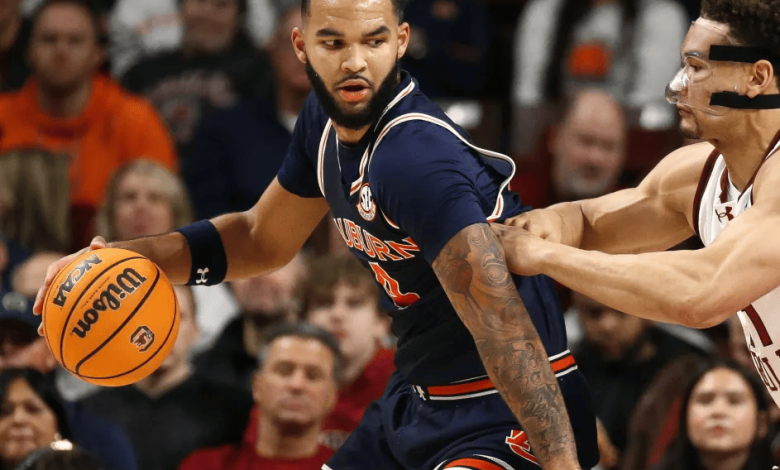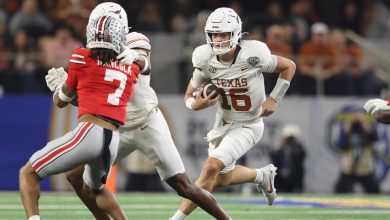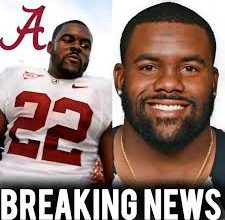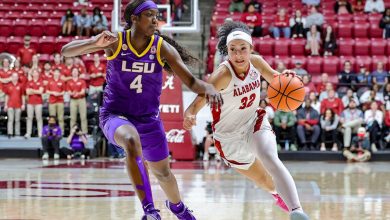What would basketball at Auburn do without Johni Broome?

Auburn basketball has seen significant success in recent years under head coach Bruce Pearl. The program has built a reputation for tough, gritty basketball, with an emphasis on defense, athleticism, and fast-paced offense. Much of that success can be attributed to standout players who have made their mark on the program and helped elevate Auburn to national prominence in the NCAA tournament. Among those players is Johni Broome, one of the most impactful and dynamic talents to come through the program in recent years.
Broome, a 6’10” forward, arrived at Auburn in 2022 after transferring from Morehead State, where he had already made a name for himself as one of the top players in the Ohio Valley Conference. Since his arrival, Broome has not only become a cornerstone for the Tigers’ frontcourt but also a critical piece of the team’s overall success. His ability to impact the game on both ends of the floor—whether it’s with his scoring, rebounding, or shot-blocking—has made him one of the most important players in the SEC. But what would Auburn basketball look like without Broome? Would they be able to maintain their level of success? In this article, we explore the importance of Johni Broome to Auburn basketball and the potential ramifications for the program if he were to be absent.
The Role of Johni Broome on the Court
Johni Broome’s impact on the court is immense. He is one of the few players in college basketball who can dominate both ends of the floor with his versatility, skill set, and work ethic. As a forward with a strong presence in the paint, Broome provides Auburn with the size and length they need in the post while also contributing to their up-tempo offense. His ability to block shots, secure rebounds, and score efficiently makes him the type of player that every coach covets.
Scoring and Offensive Impact
Offensively, Broome is a versatile weapon. While his primary role is in the paint, he has shown that he can stretch the floor when necessary. His post moves, soft touch around the rim, and ability to finish through contact are key aspects of his scoring ability. He’s also a capable mid-range shooter, and his ability to space the floor allows Auburn’s offense to function smoothly. His scoring efficiency is a critical factor in the Tigers’ offensive success, as he provides the team with a reliable inside presence that forces defenses to collapse into the paint, opening up opportunities for Auburn’s shooters on the perimeter.
Without Broome, Auburn would lose their primary inside presence, which could make them far more one-dimensional offensively. The Tigers rely heavily on a balanced attack, and Broome’s ability to both score and facilitate offense through his passing and court awareness is a key element in that balance. Auburn’s offense would likely be forced to lean more heavily on outside shooting, which is an area where the team has had mixed results historically. While Auburn has talented guards and wing players, none of them possess Broome’s unique blend of size, skill, and basketball IQ in the post. Without him, the Tigers would lack the consistent inside scoring that has kept opposing defenses honest.
Rebounding and Defensive Presence
One of Broome’s most vital contributions to Auburn’s success is his rebounding. As a big man who can dominate the glass, Broome helps the Tigers win the battle for second-chance opportunities and deny opponents additional possessions. His ability to secure defensive rebounds and push the ball up the floor quickly is a major asset to the team’s transition offense. On the defensive end, Broome is a formidable shot-blocker who can alter or eliminate scoring opportunities around the rim. He has the instincts and timing to be a difference-maker, preventing easy layups and forcing opponents to adjust their shot selection.
If Auburn were to lose Broome, the team’s defensive presence would suffer significantly. Broome’s shot-blocking ability is not only a deterrent but also a catalyst for Auburn’s fast-paced transition game. Without him in the middle, opponents would likely have more freedom to attack the rim, knowing that there wouldn’t be as much of a shot-blocking threat. Additionally, Broome’s rebounding prowess allows Auburn to control tempo and limit opponents’ second-chance points. Without his presence on the glass, Auburn would face challenges securing defensive rebounds, which could put additional pressure on their guards and wings to crash the boards, disrupting the flow of the offense.
Leadership and Intangibles
While Broome’s on-court abilities are undeniable, his leadership and intangibles are equally valuable to the Auburn program. Leadership is often the difference between a good team and a great team, and Broome provides exactly that. His experience, having played at the collegiate level for multiple years, allows him to lead both on and off the court. He has established himself as a vocal leader in the locker room, encouraging his teammates, holding them accountable, and setting an example of what it means to compete at the highest level.
Broome’s leadership is especially important for a team like Auburn, which has a mix of experienced players and newcomers. Young players and transfers may look to Broome for guidance and mentorship, and his ability to keep the team focused and motivated through the ups and downs of the season cannot be overstated. He is the type of player who leads by example, showing up every day with a relentless work ethic and commitment to improving his game.
Without Broome, Auburn could find it difficult to maintain the level of intensity and cohesion that has been characteristic of their success under Bruce Pearl. The Tigers would need other players to step up and fill the leadership void, which is no small task. While players like Wendell Green Jr. and Allen Flanigan are also important leaders on the team, Broome’s unique position as a senior and a key player in the frontcourt makes his leadership especially vital.
What Happens to Auburn Basketball Without Broome?
Offensive Challenges
Without Broome in the lineup, Auburn would face significant challenges in terms of their offensive production. The Tigers would have to find new ways to generate offense in the paint. While Auburn has capable guards and wings, none of them have the same physical presence as Broome in the post. Players like Johni Broome are rare, and losing him would create a hole in Auburn’s offensive identity. The team would likely need to rely more heavily on perimeter shooting and outside scoring, which could place a lot of pressure on players like Green, Flanigan, and Jaylin Williams to step up in a bigger role. Auburn’s offense could become more predictable without a player who can both score in the paint and create space for others.
Defensive Vulnerabilities
Broome’s absence would also create significant gaps defensively. The Tigers’ defense, which has been a hallmark of Bruce Pearl’s teams, would lose its most reliable rim protector. Without Broome, Auburn’s defense would likely become less imposing, with opponents able to attack the rim more freely. The Tigers would need someone else to step up as a shot-blocker, and while players like Dylan Cardwell have shown promise in this area, they would not be able to replace Broome’s level of impact all by themselves.
Auburn would also need to adjust to a potentially more perimeter-oriented defense without Broome in the middle. Opposing teams would look to exploit mismatches, particularly in pick-and-roll situations, knowing that there is less resistance in the paint.
Emotional and Psychological Impact
Beyond the physical and tactical consequences, Broome’s absence would have an emotional and psychological impact on the Auburn team. The Tigers have built a culture of resilience, and much of that culture is embodied by Broome. Losing a player of his caliber can be a significant blow to team morale, especially if the injury is long-term. The emotional lift that a player like Broome provides—through his leadership, his hustle, and his commitment—would be tough to replace.
In terms of recruiting and program momentum, Broome’s success at Auburn also serves as a signal to future recruits about the program’s commitment to player development and winning. Without Broome, Auburn may struggle to maintain the same level of national attention and credibility, especially in such a competitive conference as the SEC.









